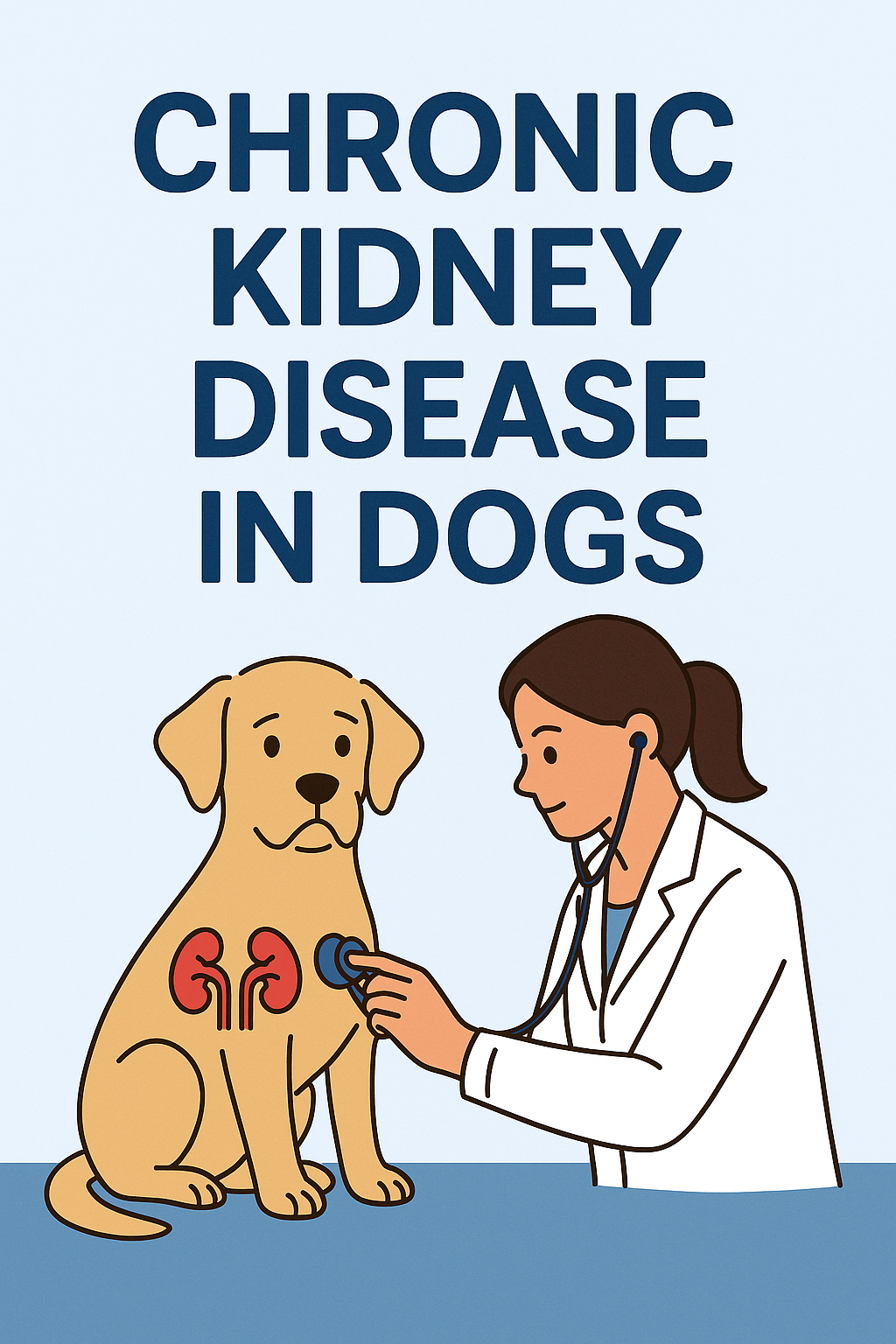
🐶 Chronic Kidney Disease in Dogs – Symptoms, Causes, Treatment, and Management Guide
Chronic Kidney Disease in Dogs – Symptoms, Causes, Treatment, and Management Guide
What Is Chronic Kidney Disease in Dogs?
Chronic Kidney Disease (CKD) in dogs is a progressive condition where the kidneys lose their ability to function properly over time.
As the kidneys deteriorate, they become less efficient at removing waste, balancing fluids and electrolytes, and producing vital hormones.
CKD is especially common in older dogs, and early detection and proper management are key to improving quality of life and extending lifespan.
🚨 Common Symptoms of Kidney Failure in Dogs (Focus Keyword)
-
Excessive thirst (polydipsia)
-
Frequent urination (polyuria)
-
Decreased appetite and weight loss
-
Vomiting and nausea
-
Bad breath (uremic odor)
-
Lethargy and reduced activity
-
Dehydration and dry skin
-
In advanced stages: anemia, muscle loss, seizures, or coma
🧬 Causes and Risk Factors
-
Aging – most common cause due to natural organ wear
-
Congenital abnormalities (more common in small breeds)
-
Long-term use of NSAIDs (non-steroidal anti-inflammatory drugs)
-
High-protein diets without medical supervision
-
Infections (e.g., leptospirosis)
-
Urinary tract obstruction or stones
-
Heart disease and hypertension
🔍 How Is Kidney Disease Diagnosed?
-
Blood tests – check BUN, creatinine, phosphorus, and SDMA
-
Urinalysis – evaluate urine specific gravity and protein levels
-
Ultrasound or X-ray – assess kidney size, shape, and structure
-
Blood pressure monitoring – detect hypertension related to kidney damage
💊 Treatment and Management of Canine Kidney Disease
✅ 1. Diet Management
-
Switch to renal prescription diets that are low in protein, phosphorus, and sodium
-
Increase moisture intake via wet food or hydration additives
✅ 2. Medications
-
Phosphate binders, anti-nausea meds, antacids, blood pressure medication, and anemia treatments depending on the dog's condition
✅ 3. Fluid Therapy
-
Subcutaneous fluid injections help manage dehydration and flush toxins
✅ 4. Ongoing Monitoring
-
Schedule blood and urine tests every 2–3 months to track kidney function and electrolyte balance
🛒 Recommended Products for Kidney Care
-
Prescription renal diets (wet and dry)
-
Hydration supplements and water enhancers
-
Phosphate binders and subcutaneous fluid kits
👉 Explore Dog Kidney Care Products
External Resource (DoFollow)
For more detailed information, visit the American College of Veterinary Internal Medicine – Kidney Disease in Dogs
Internal Resource
👉 Related article: Tracheal Collapse in Dogs – Symptoms and Daily Care Guide
🧩 Frequently Asked Questions (FAQ)
Q1. Is chronic kidney disease in dogs curable?
A1. Unfortunately, CKD is not curable, but with proper treatment,
dogs can live comfortably and maintain a good quality of life for months or even years.
Q2. Should I encourage my dog to drink more water?
A2. Yes. Adequate hydration is critical for dogs with kidney disease.
Ensure that fresh, clean water is always available.
Q3. What should I focus on during the early stages?
A3. Early care should include dietary adjustments, hydration support,
monitoring for proteinuria and high blood pressure, and routine lab testing.
🥦 Best Foods and Dietary Tips for Dogs with Chronic Kidney Disease
Proper nutrition plays a vital role in slowing the progression of chronic kidney disease (CKD) in dogs.
A well-managed diet can reduce the burden on the kidneys, maintain quality of life, and support overall health.
✅ Recommended Foods for Kidney Support
-
Prescription renal diets
These specially formulated dog foods contain low levels of phosphorus, protein, and sodium, while providing essential nutrients.
They are often enriched with omega-3 fatty acids and antioxidants. -
Boiled egg whites
A high-quality, low-phosphorus protein source that supports muscle maintenance without overworking the kidneys. -
Pumpkin (plain, cooked)
Rich in fiber and antioxidants, pumpkin supports digestion and helps control potassium levels naturally. -
White rice and lean chicken (skinless, boneless, unseasoned)
Gentle on the stomach and easily digestible for dogs with reduced appetite. -
Omega-3-rich fish (like sardines or salmon, cooked without salt)
Help reduce inflammation in the kidneys and cardiovascular system. -
Low-sodium vegetables (steamed carrots, green beans, zucchini)
Provide hydration, fiber, and essential micronutrients. -
Hydration-focused meals
Soaked kibble, low-phosphorus wet food, or adding broth or water to meals can help increase fluid intake.
⚠️ Important Feeding Precautions
-
Avoid high-phosphorus foods
Such as dairy products, organ meats (like liver or kidney), and bones. -
Limit high-protein treats
Overloading protein can worsen kidney damage; always follow your vet’s recommendation on protein levels. -
Do not give over-the-counter supplements without veterinary approval
Certain vitamins and minerals (like vitamin D or calcium) can accumulate and harm the kidneys. -
Minimize sodium intake
Excess salt can contribute to hypertension and fluid retention. -
Encourage gradual eating
If your dog is nauseous or lacks appetite, offer small, frequent meals with enticing aromas.
🐾 Bonus Tip: Work with Your Vet for a Custom Plan
Every dog with CKD has unique needs depending on the disease stage.
Always consult your veterinarian before making dietary changes, and request routine bloodwork to monitor phosphorus, BUN, and creatinine levels.

